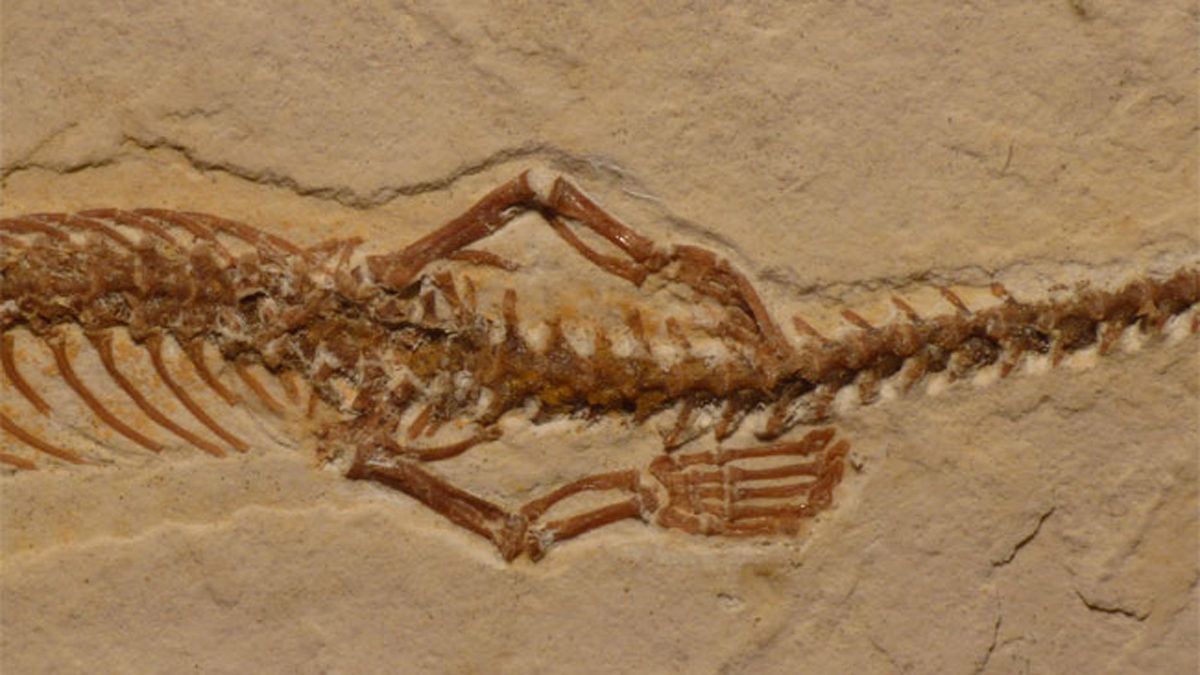Four-legged snake discovered in German museum
UK professor stunned by 'once-in-a-lifetime discovery'

A free daily email with the biggest news stories of the day – and the best features from TheWeek.com
You are now subscribed
Your newsletter sign-up was successful
The fossil of a snake with four small legs has been identified by a UK professor during a visit to a German museum.
Professor David Martill from the University of Portsmouth discovered the snake while leading a group of students through the Bürgermeister Müller Museum in Solnhofen, Germany.
Martill was examining what appeared to be a fossil of a run-of-the-mill snake, labelled as "Unknown Fossil", before noting that the rock in which it was embedded had characteristics of the Brazilian Crato Formation, a site that dates to the early Cretaceous period. Snake fossils had been found in that period but never that location, according to National Geographic.
The Week
Escape your echo chamber. Get the facts behind the news, plus analysis from multiple perspectives.

Sign up for The Week's Free Newsletters
From our morning news briefing to a weekly Good News Newsletter, get the best of The Week delivered directly to your inbox.
From our morning news briefing to a weekly Good News Newsletter, get the best of The Week delivered directly to your inbox.
Martill then noticed a pair of hind legs. Fossils have been found depicting snakes with stunted hind legs, and present-day boas and pythons still exhibit small spurs where legs once were.
"I looked even closer – and my jaw was already on the floor by now – and I saw that it had tiny little front legs! ... no snake has ever been found with four legs. This is a once-in-a-lifetime discovery," said Martill, who has named the reptile Tetrapodophis, meaning four-legged snake.
There are two competing theories about how today's slithering snakes evolved. The first holds that snakes first evolved in the ocean. The second hypothesis – which this new discovery seems to support – is that snakes evolved from burrowing lizards, which over time stretched their bodies and shirked their limbs to better manoeuvre their way through the ground.
Martill thinks that this snake killed its prey by constriction, like many present-day snakes do. "Why else have a really long body?" he says. He thinks that the snakes may have used their "strange, spoon-shaped feet" to restrain struggling prey – or unwilling mates – as they are too small to support the reptile's full body when walking.
A free daily email with the biggest news stories of the day – and the best features from TheWeek.com
But is this fossil even a snake? Michael Caldwell from the University of Alberta doesn't think so. He says that the Tetrapodophis lacks unique features in its spine and skull that would solidify a connection. "I think the specimen is important, but I do not know what it is," he says. "I might be wrong… I'm looking forward to visiting Solnhofen."
-
 Trump touts pledges at 1st Board of Peace meeting
Trump touts pledges at 1st Board of Peace meetingSpeed Read At the inaugural meeting, the president announced nine countries have agreed to pledge a combined $7 billion for a Gaza relief package
-
 Britain’s ex-Prince Andrew arrested over Epstein ties
Britain’s ex-Prince Andrew arrested over Epstein tiesSpeed Read The younger brother of King Charles III has not yet been charged
-
 Political cartoons for February 20
Political cartoons for February 20Cartoons Friday’s political cartoons include just the ice, winter games, and more
-
 Home Office worker accused of spiking mistress’s drink with abortion drug
Home Office worker accused of spiking mistress’s drink with abortion drugSpeed Read Darren Burke had failed to convince his girlfriend to terminate pregnancy
-
 In hock to Moscow: exploring Germany’s woeful energy policy
In hock to Moscow: exploring Germany’s woeful energy policySpeed Read Don’t expect Berlin to wean itself off Russian gas any time soon
-
 Were Covid restrictions dropped too soon?
Were Covid restrictions dropped too soon?Speed Read ‘Living with Covid’ is already proving problematic – just look at the travel chaos this week
-
 Inclusive Britain: a new strategy for tackling racism in the UK
Inclusive Britain: a new strategy for tackling racism in the UKSpeed Read Government has revealed action plan setting out 74 steps that ministers will take
-
 Sandy Hook families vs. Remington: a small victory over the gunmakers
Sandy Hook families vs. Remington: a small victory over the gunmakersSpeed Read Last week the families settled a lawsuit for $73m against the manufacturer
-
 Farmers vs. walkers: the battle over ‘Britain’s green and pleasant land’
Farmers vs. walkers: the battle over ‘Britain’s green and pleasant land’Speed Read Updated Countryside Code tells farmers: ‘be nice, say hello, share the space’
-
 Motherhood: why are we putting it off?
Motherhood: why are we putting it off?Speed Read Stats show around 50% of women in England and Wales now don’t have children by 30
-
 Anti-Semitism in America: a case of double standards?
Anti-Semitism in America: a case of double standards?Speed Read Officials were strikingly reluctant to link Texas synagogue attack to anti-Semitism